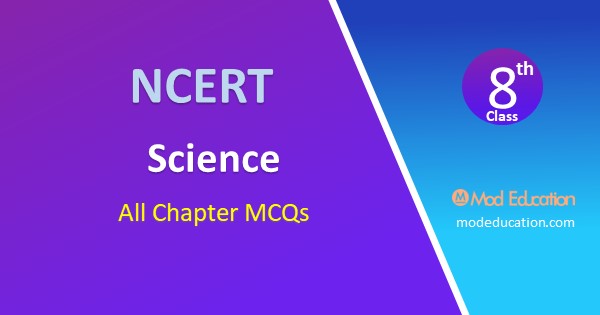MCQ Questions for Class 8 Science Chapter 14 : NCERT CBSE RBSE other Board MCQ Questions for Class 8 Science Chapter 14 Chemical Effects of Electric Current with Answers Pdf free download. MCQ Questions for Class 8 Science with Answers were prepared based on the latest exam pattern.

MCQ Questions for Class 8 Science Chapter 14 Chemical Effects of Electric Current with Answers
Question 1.
Which of the following is a bad conductor of electricity?
(a) Distilled water
(b) Silver nitrate
(c) Sulphuric acid
(d) Copper sulphate
Answer: (a) Distilled water
Question 2.
Which of the following does not conduct electricity?
(a) Sugar solution
(b) Vinegar solution
(c) Lemon juice solution
(d) Caustic soda solution
Answer: (a) Sugar solution
Question 3.
An electric current can produce
(a) heating effect
(b) chemical effect
(c) magnetic effect
(d) all of these
Answer: (d) all of these
Question 4.
Pure or distilled water is a
(a) poor conductor
(b) good conductor
(c) both (a) and (b)
(d) none of these
Answer: (a) poor conductor
Question 5.
Which of the following is a good conductor?
(a) Brick
(b) Steel
(c) Plastic
(d) Cotton
Answer: (b) Steel
Question 6.
Polythene is
(a) a conductor
(b) an insulator
(c) both (a) and (b)
(d) none of these
Answer: (b) an insulator
Question 7.
Electroplating is based on
(a) heating effect of electricity
(b) chemical effect of electricity
(c) physical effect of electricity
(d) magnetic effect of electricity
Answer: (b) chemical effect of electricity
Question 8.
Copper is
(a) a good conductor
(b) an insulator
(c) both (a) and (b)
(d) none of these
Answer: (a) a good conductor
Question 9.
Waste from an electroplating factory must be disposed off
(a) in the nearby river
(b) in the nearby pond
(c) in the nearby cornfield
(d) according to the disposal guidelines of Waste Management Bodies
Answer: (d) according to the disposal guidelines of Waste Management Bodies
Question 10.
An electrolyte is
(a) a metal
(b) a liquid that conducts current
(c) a non-metal
(d) none of these
Answer: (b) a liquid that conducts current
Question 11.
Flow of electron is called
(a) electrolyte
(b) electroplating
(c) electrodes
(d) electric current
Answer: (d) electric current
Q12. When current flows through a conducting solution than the electrode connected to the negati’wc terminal of the battery is called :
(a) anode
(b) cathode
(c) rod
(d) none of these
Answer: (b) cathode
Q13. Electroplating is based on
(a) heating effect of electricity
(b) chemical effect of electricity
(c) physical effect of electricity
(d) magnetic effect of electricity
Answer: (b) chemical effect of electricity
Q14. Current is the flow of:
(a) electrons
(b) protons
(c) neutrons
(d) none of these
Answer: (a) electrons
Q15. Copper is
(a) a good conductor
(b) an insulator
(c) both (a) and (b)
(d) none of these
Answer: (a) a good conductor
Q16. A battery is used to:
(a) convert chemical current into electric
(b) maintain a potential difference current
(c) measure the current
(d) measure the temperature
Answer: (a) convert chemical current into electric
Q17. Waste from an electroplating factory must be disposed off
(a) in the nearby river
(b) in the nearby pond
(c) in the nearby cornfield
(d) according to the disposal guidelines of Waste Management Bodies
Answer: (d) according to the disposal guidelines of Waste Management Bodies
Q18. When electric current is passed through the copper sulphate solution, copper sulphate dissociates into:
(a) copper and sulphur
(b) copper and oxygen
(c) copper and sulphate
(d) none of these
Answer: (c) copper and sulphate
Q19. An electrolyte is
(a) a metal
(b) a liquid that conducts current
(c) a non-metal
(d) none of these
Answer: (b) a liquid that conducts current
Q20. The cans, used for storing food, are made by electroplating ……………. on to irons
(a) chromium
(b) zinc
(c) tin
(d) none of these
Answer: (c) tin
Match the items given in column I suitably with those given in column II.
| Column I | Column II |
| 1. Closed path | (a) Good conductor |
| 2. LED | (b) Deflection of compass |
| 3. Carbon rod | (c) Positively charged ion |
| 4. Galvanisation | (d) Poor conductor of electricity |
| 5. Distilled water | (e) Coating with zinc |
| 6. Salt solution | (f) Electrodes |
| 7. Cation | (g) Light emitting diodes |
| 8. Magnetic effect of current | (h) Electric circuit |
| 9. Chromium | (i) Negatively charged ion |
| 10. Anion | (j) Electroplating |
Answer:
| Column I | Column II |
| 1. Closed path | (h) Electric circuit |
| 2. LED | (g) Light emitting diodes |
| 3. Carbon rod | (f) Electrodes |
| 4. Galvanisation | (e) Coating with zinc |
| 5. Distilled water | (d) Poor conductor of electricity |
| 6. Salt solution | (a) Good conductor |
| 7. Cation | (c) Positively charged ion |
| 8. Magnetic effect of current | (b) Deflection of compass |
| 9. Chromium | (j) Electroplating |
| 10. Anion | (i) Negatively charged ion |
